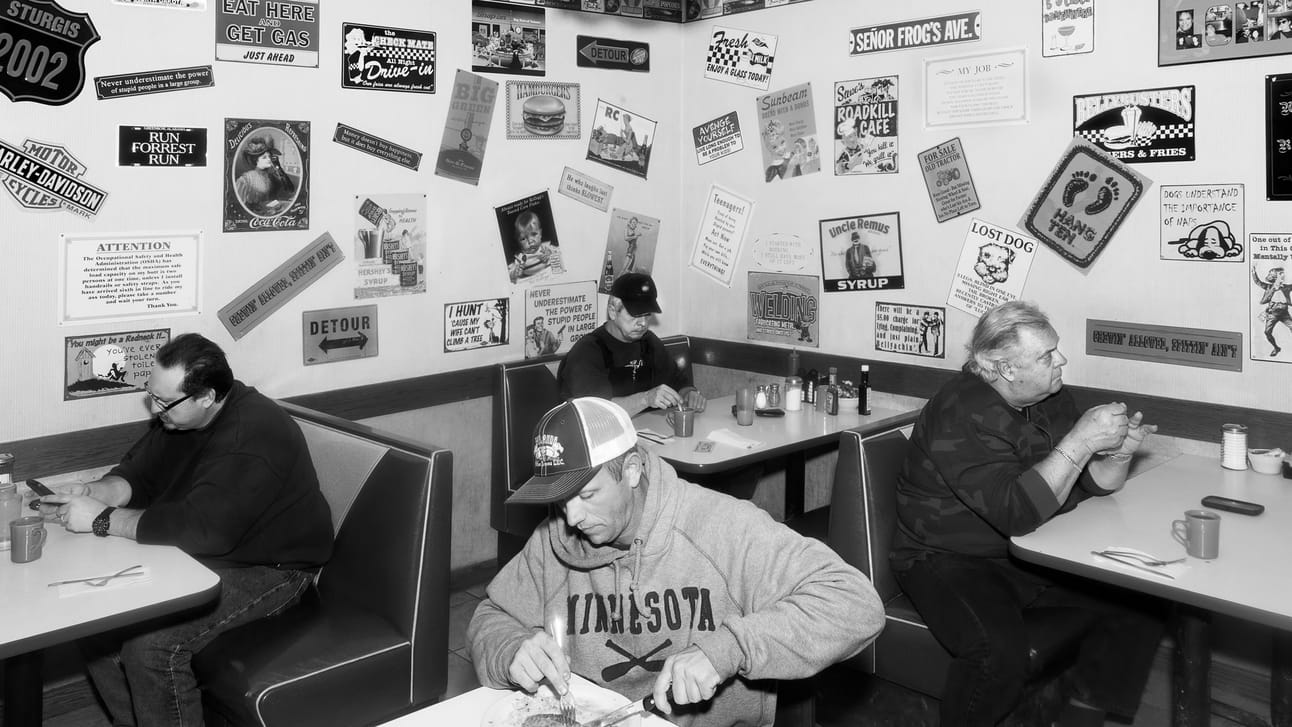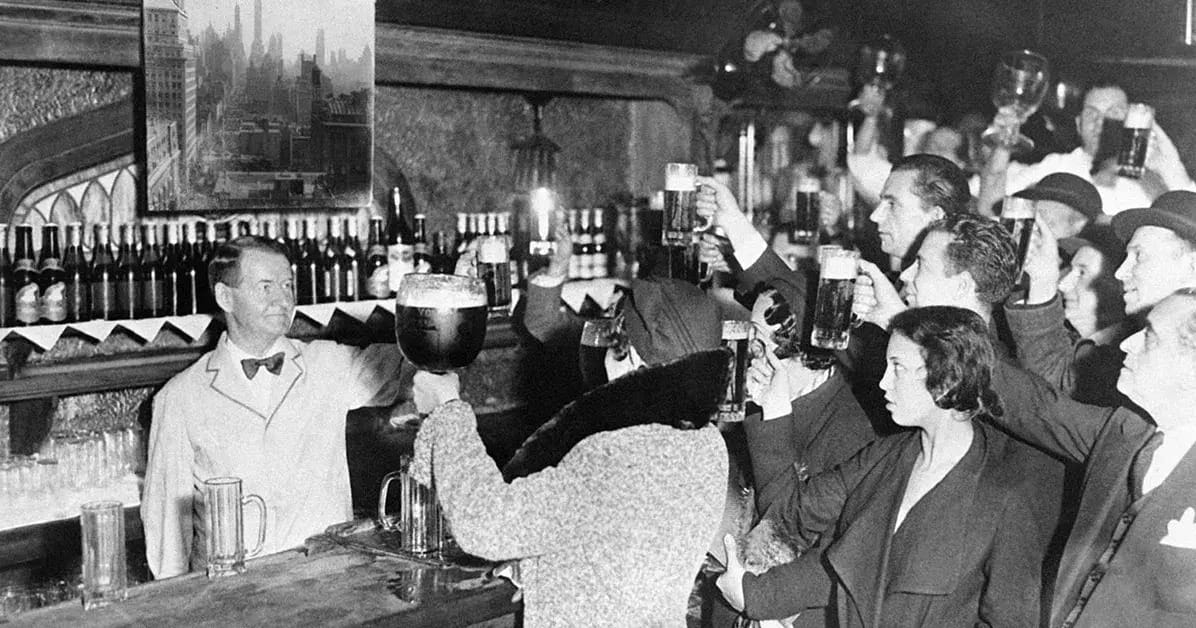- After Hours
- Posts
- ISSUE #003
ISSUE #003
Why is Everybody so Lonely?
After Hours
The weekly newsletter covering tech, culture & life outside our digital world

ISSUE #003: Why is Everybody so Lonely?
1 Thing From Me
THE INTRO
Americans are lonelier than ever. 50% of adults reported feeling this way and we’re spending less time together than ever before.

Smartphones have accelerated isolating trends since they reached critical mass in 2012. It’s not just the kiddos either, it’s all of us.
Set against the backdrop that our lives typically become more lonesome as we age, we can’t afford to forgo relationships and genuine connection in our youth— we’ll never get the time back.
What the hell, I'm lonely just writing this… I should call somebody…
When I'm looking for advice—I mean real advice—the best wisdom I get usually comes from my elders. They have a near century's worth of lived experience to pull from, plus it never hurts giving 'em a call.
So I did. I called my Grandpa to ask him a question:
Why is everybody so lonely?
THE PHONE CALL

Joanna Karpowicz, One Phone Call, 2017
Me: Why is everybody so lonely?
Grandpa: "Oh I'm not an expert on these things, I haven't thought about it much. I suspect we have now an entire generation that has grown up with a phone. It serves as a crutch because you can always pretend to have something going on. Rather than reach out to people you can reach into your pocket and act like you have something important."
Me: Why are people less willing to talk to each other?
Grandpa: "Like anything, the more you do it, the more confidence you get. My guess is, for a long time, people aren't participating in meaningful conversations. And when you're not good at it something, you don't tend to do it.
It's like making your first public speech. At the beginning you're all nervous and feel like the whole world's watching. But then, the more times you get up there and do it, the more you're going to feel confident to do it.
We're all afraid of being turned down. Nobody wants to be rejected. We think of that as defeat. Consequentially, no one takes a chance."
Me: How have you made your relationships last all these years?
Grandpa: "With my friends I assume you mean? Gosh, I don't know. Well, I'm certain there are reasons.
One thing is that I'm usually the one to take initiative and make contact. People are moving from place to place, so it's hard to stay in touch. Next thing you know 6 months go by, a year goes by, it gets to the point where it's been so long that it's kind of awkward. What I do, is I pick up the phone and just say, "Hey how's it going, I was just thinking about you!" You'd be amazed at how receptive people are.
Another thing I do is send Christmas cards. I write every card with a personal note on the back. I send them to people I'll never see again. I don't hear back from a lot of them. I probably send about 160 cards every year, I don't hear back from maybe 100 of them. But I still send them every year because they're good people."
Me: Do you have an activity where you get together with your friends regularly?
Grandpa: "We have a breakfast group."
ON LONELINESS

Edward Hopper, Nighthawks, 1942
For starters, I felt a lot less lonely after that call. Funny how that works.
My Grandpa and I caught up and chatted for a bit about my life in New York City, our upcoming trips, and his love for Jeopardy. I felt compelled to ask him some questions as I was struggling to write this newsletter and come up with good answers myself.
My first draft was too saturated and complex, it didn't feel like I got to the core of why we're so lonely. Occam's Razor tells us that the simplest, most elegant explanation is usually the one closest to the truth.
My Grandpa came through. In short, his answer: We don't talk to enough people. We no longer feel connection because we don't put ourselves out there. It's safer for us to opt for the comfort and certainty behind our phone screen.
Take the "connection" shortcut enough times and we make ourselves feel isolated. This collective behavior also reinforces the notion that it's hard to talk to people. When talking to people is hard, we lose confidence and avoid it altogether.
It's a collective action problem, and boy are those hard to solve. The funniest part is that we are all dying for more connection and desperate for good conversation, yet none of us even bother taking the chance— no matter who we might want to talk to.
ON STRANGERS

Edvard Munch, The Lonely Ones (Two People), 1895
The loneliness equation is half talking to strangers, half nurturing our existing relationships. You can feel pretty connected solving for just one of the variables, but ideally we want solve for both. Let’s start with strangers:
Have you ever tried talking to strangers? It’s awesome. You build community, learn new perspectives, and overall feel more connected. Studies confirm that even a chat with your barista can make you happier.
Our default interactions with people these days are limited and transactional. So if you want more real connection, you're going to have to go out and get it yourself.
I can't speak for everybody, but I'll try: most people secretly do want to get off their phones and talk to people but are scared/unable to handle their failings.
Understanding this to be generally true (which in my experience it is), most people will be welcoming of conversation (in the right situations) and grateful you exhibited the courage to talk to them in the first place.
So in order to feel less lonely, we need to get comfortable talking to more people. But in order to get comfortable talking to more people, we must first overcome our fear of rejection.
I was able to overcome this fear myself through paradoxical intention. Austrian psychiatrist Viktor E. Frankl coined the term and proposed the following way to treat his patients' phobias:
Fear/anxiety cannot be reasoned with and must be replaced by a paradoxical wish in favor of what the person had hoped to avoid.
A man who anticipated sweating excessively was directed to deliberately show how much he could sweat.
A boy who stuttered was told to stutter on purpose.
A woman suffering from insomnia should hope to stay awake all night.
To combat the anticipatory anxiety that arises from wanting to prevent a certain outcome— sweating too much, stuttering, not being able to sleep, rejection— you can trick you mind by wanting the opposite.
Paradoxical intention works because it utilizes the human capacity for self-detachment. If you can laugh at yourself, you put a distance between yourself and the symptom, and expose the trivial nature of your affliction.
At a bar I'll say to my friends "Watch how quick she's gonna reject me" then turn around and talk to that girl.
When I feel anxiety rising in me before a presentation, I'll take a deep breath in and say to myself, "Hey it's not so bad, after you fail they're all going to pull out their guns and open fire on you. It'll be over quick."
You can get creative with it.
The first time approaching somebody can feel daunting, especially if you want it to go well. It helps to use paradoxical intention or find some other way to detach yourself from the outcome of the situation. Regardless, you'll survive on the other side of it.
After you force those first words out, you'll find that the rest of conversation happens naturally. And that the fear was illusory all along. Keep getting in the reps and pretty soon you'll be confident enough to talk to anybody.
What do you think? Try it out this weekend. If you see someone you want to talk to: whisper to yourself the worst scenario you can hope for, have a laugh, and then go for it.
NEXT WEEK
Talking to new people is only half of loneliness equation. The other half involves our existing relationships.
I hope I left you with some good insight. If I did, stick around for next week's issue where I'm going to expand this analysis.
Specifically, I want to provide you with the easiest possible ways to take back initiative in your existing relationships so we can all feel a little less lonely in our lives.
Until then, I'll leave you with this cryptic question to decode:
What's your 1x a week?
See you next Friday.
— Kyle
From The Feed
“Conversation can make peace, conversation can make war.” Never underestimate the value of talking to people.
not to be controversial but you should be allowed to leave work early to get drinks if the weather is nice enough
— Chris (@citehchris)
8:20 PM • Mar 10, 2025
This may work its way into French parliament.
Just raw dogged a 6 minute drive to McDonald’s. No Twitter, no youtube shorts no texting. Locked in on the road the whole time. Built different.
— radbro (@radbro)
7:12 PM • Mar 10, 2025
2025 we raw dogging everythinggg
From The Community

This newsletter isn't just my voice echoing into the void (actually it is)— it's the beginning of a conversation. And like any good conversation at a dimly lit bar, I want to hear your stories.
Share with me:
Literally anything
I haven’t heard much from the community in the past two weeks, which is understandable. I’m still new to you guys. Let me up the offer.
Reply to this email with a story and your venmo handle. I will pay you in proportion to the value of your story, and the best ones will be featured anonymously in next week's issue.
What’s Next

You’ll be hearing a lot more from me. If you enjoyed reading this issue, please consider subscribing to receive a new edition of After Hours every Friday.
Subscribe to our events calendar if you want to join us offline! Upcoming events are below:

Reply